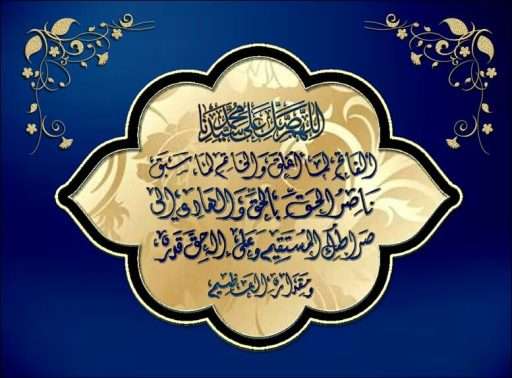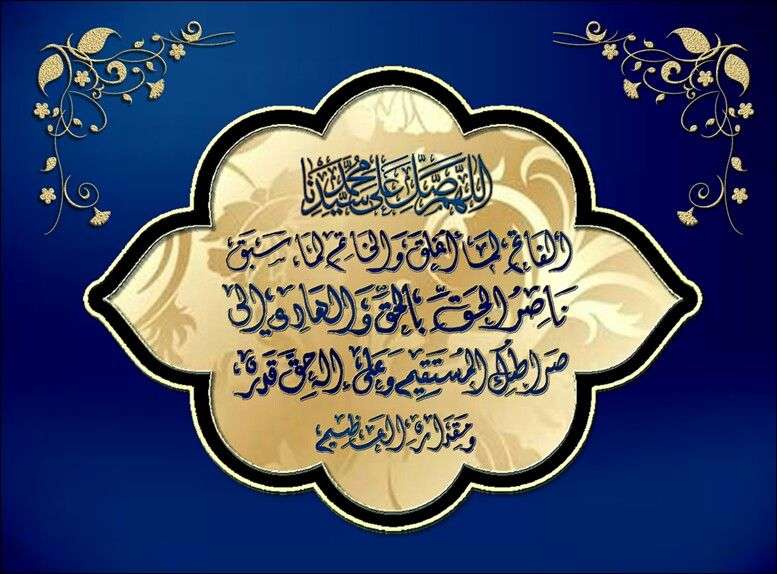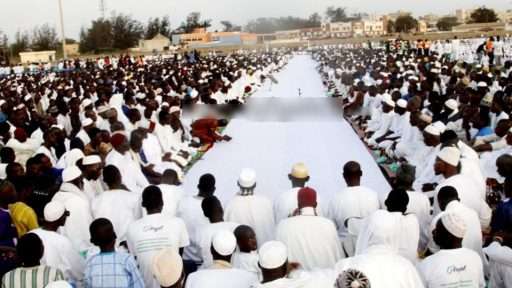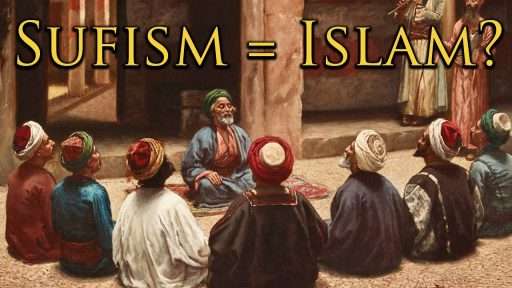
 Sheikh Imam Hassan ibn Ali Cisse’s says grandfather Abul Fayd Shiek Ibrahim b. Abdullahi Niass (d. 1390/1975) says in Ruh al-Adab,
Sheikh Imam Hassan ibn Ali Cisse’s says grandfather Abul Fayd Shiek Ibrahim b. Abdullahi Niass (d. 1390/1975) says in Ruh al-Adab,
The critics of Sufism, and particularly the critics of the Tijaniyat Order, have heavily criticized this particular formula (Salat al-Fatih) because of the claim that the formula is divinely inspired, and not based on a mental construction like most other formulas. To understand the position of inspiration in Islam, we start by looking at the statement of Allah in the Quran, “It is not fitting for a man that Allah should speak to him except by inspiration, or from behind a veil, or by the sending of a messenger to reveal, with Allah’s permission, what Allah wills: for He is Most High, Most Wise” [42:51].
The popularly accepted English translation of the Holy Quran makes a comment on the above verses in commentary No. 4598 thus: “God is Most High, Most Wise. Man, despite of his high destiny, is often the lowest of the low. Yet God, out of His infinite Mercy and Grace, has bestowed His Revelation on man. How does it come about? Three ways are mentioned:
(1) Inspiration (wahy);
(2) from behind a veil, and
(3) by the sending of a Messenger.”
Inspiration is interpreted as being of two kinds;
(a) a suggestion thrown by Allah into the heart or mind of man, by which he understands the substance of the message, whether it is a command or prohibition, or an explanation of a great truth; and
(b) Verbal or literal inspiration by which the actual words of God are conveyed in human language.
Sunni opinion admits the existence of both kinds, although the latter (“al-matlu”; the recited) is held to be of a superior degree, only vouchsafed to the Greater Prophets. While the former (“ghair al-matlu”) may be given not only to Greater Prophets, but also to other men of spiritual insight who have not attained the degree of Prophethood. If we accept the theory of verbal inspiration, it would also cover the messages brought by the angel Gabriel (peace upon him). The translator Yusuf Ali clarified further in commentaries 4599 and 4600 thus: “Behind a veil: not of course, a material veil (or screen or purdah), but the mystic veil of light (i.e. 70,000 veils of light).
(…) From the above commentary of the Quran by an internationally accepted translation, we conclude that inspiration (wahy), other than recited (ghairi al-matlu), can be received by men of spiritual insight who have not attained Prophethood. Allah says, “Fear Allah and Allah shall teach you.” [2:282] and, “O ye who believe! When ye deal with each other, in transactions involving future obligations in a fixed period of time, reduce them to writing Let a scribe write down faithfully as between the parties: let not the scribe refuse to write: as Allah Has taught him, so let him write. Let him who incurs the liability dictate, but let him fear His Lord Allah, and not diminish aught of what he owes. If they party liable is mentally deficient, or weak, or unable Himself to dictate, Let his guardian dictate faithfully, and get two witnesses, out of your own men, and if there are not two men, then a man and two women, such as ye choose, for witnesses, so that if one of them errs, the other can remind her. The witnesses should not refuse when they are called on (For evidence). Disdain not to reduce to writing (your contract) for a future period, whether it be small or big: it is juster in the sight of Allah, More suitable as evidence, and more convenient to prevent doubts among yourselves but if it be a transaction which ye carry out on the spot among yourselves, there is no blame on you if ye reduce it not to writing. But take witness whenever ye make a commercial contract; and let neither scribe nor witness suffer harm. If ye do (such harm), it would be wickedness in you. So fear Allah; For it is Good that teaches you. And Allah is well acquainted with all things. If ye are on a journey, and cannot find a scribe, a pledge with possession (may serve the purpose). And if one of you deposits a thing on trust with another, let the trustee (faithfully) discharge his trust, and let him Fear his Lord conceal not evidence; for whoever conceals it, – his heart is tainted with sin. And Allah knoweth all that ye do. Also in the Quran, “We taught man that which he knew not”. [96:5]
We can also conclude that God fearing pious servants are blessed with this type of spiritual inspiration. The above conclusions are supported in various places in the Quran, as people like the mother (may Allah be satisfied with him) of Moses (peace upon him) who was not a prophet, received an inspiration directly from Allah as in the Chapter of Ta-Ha (Ch. 18), “Behold! We sent to thy mother, by inspiration, the message. Throw (the child) into the chest, and throw (the chest) into the river: the river will cast him up on the bank, and he will be taken up by one who is an enemy to Me and an enemy to him’: But I cast (the garment of) love over thee from Me: and (this) in order that thou mayest be reared under Mine eye”. [20:39] Another example of an inspiration, being in the form of a suggestion thrown into a pious Heart by Allah, was shown in the case of the encounter by Hadrat Khidhr (may Allah be satisfied with him) and Prophet Moses (peace upon him) when Hadrat Khidr (may Allah be satisfied with him) concluded his action by saying, as in the Quran, “I did it not of my own accord. Such is the interpretation of (those things) over which thou wast unable to hold (with) patience. As for the wall, it belonged to two youths, orphans, in the Town; there was, beneath it, a buried treasure, to which they were entitled: their father had been a righteous man: So thy Lord desired that they should attain their age of full strength and get out their treasure – a mercy (and favour) from thy Lord. I did it not of my own accord. Such is the interpretation of (those things) over which thou wast unable to hold patience.” [18:82]
Here the statement simply implies that (he) too was inspired, to carry out such action. The story of Jesus’ (peace upon him) mother (may Allah be satisfied with him) was another glaring example. Allah Almighty says, “Relate in the Book (the story of) Mary, when she withdrew from her family to a place in the East. She placed a screen (to screen herself) from them; then We sent her our angel, and he appeared before her as a man in all respects. She said: “I seek refuge from thee to (Allah) Most Gracious: (come not near) if thou dost fear Allah.” He said: “Nay, I am only a messenger from thy Lord, (to announce) to thee the gift of a holy son”. [19:17-9] Such was also the case of the Companions of the Prophet (peace and blessing be upon him) whom the Prophet (peace and blessing be upon him) told that their guest or stranger, was no other than angel Gabriel (peace upon him) who came to teach them their religion, as contained in a Hadith related by Omar ibn Khattab (may Allah be satisfied with him) the second Caliph. Furthermore in the Quran, Allah says: “And out of His (Allah’s) signs is your sleeping during the night and day” [30:23]. And among His Signs is the sleep that ye take by night and by day, and the quest that ye (make for livelihood) out of His Bounty: verily in that are signs for those who hearken.
One of the important happenings in sleeping, during the day or night, is a dream. The Prophet (peace and blessing be upon him) used to ask his companions if they saw a dream in their sleep. The most authoritative and most authentic of narrations of the Hadith of the Prophet (peace and blessing be upon him) is the Sahih Bukhari. His collection has a section of 48 chapters in volume 9, devoted to the interpretation of dreams as reported from the most knowledgeable Prophet (peace and blessing be upon him). Chapter 3 starts with a heading “Dreams are from Allah” He then narrated the Hadith of Abu Qatada which narrates from the Prophet (peace and blessing be upon him) that: “A true good dream is from Allah, and a bad dream is from Satan” Chapter 4 of the same section has a heading “A righteous good dream that comes true is one of the forty-six parts of Prophethood” Here a Hadith from Abu Huraira (may Allah be satisfied with him) says: “For sure the Messenger of Allah says; the dream of a faithful believer is a part of the forty-six parts of Prophethood.”





